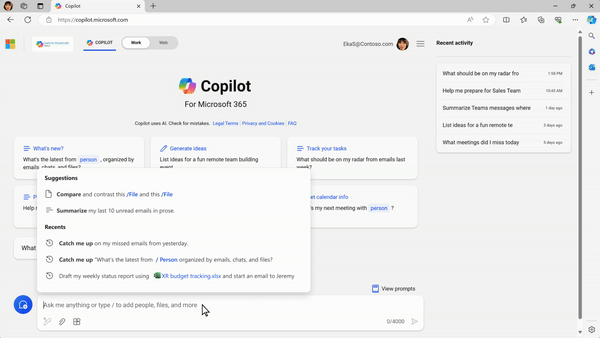- Microsoft introduces advanced AI features in Copilot for Microsoft 365.
- Auto-complete functionality enhances prompt creation by suggesting improvements.
- “Elaborate your prompt” feature refines prompts for optimal outcomes.
- Copilot Lab empowers users to create, publish, and manage tailored prompts.
- “Catch Up” chat interface facilitates seamless meeting preparation by surfacing relevant information.
- Work Trend Index report reveals insights into AI adoption and its impact on the workplace.
- 78% of AI users integrate personal AI tools into their workflow, driving productivity.
- Emergence of “AI power users” reshapes business processes, saving significant time.
- Microsoft’s AI investments yield promising returns, contributing to revenue growth.
Main AI News:
Microsoft is reshaping the landscape of prompt engineering with innovative AI features in Copilot, striving to empower every user in this domain. In a bid to enhance the efficacy of generative AI, Copilot for Microsoft 365 will introduce an auto-complete functionality, offering suggestions to refine AI prompts effectively.
This forthcoming enhancement in Copilot will seamlessly augment prompts with additional insights, ensuring superior outcomes in content generation and inquiry formulation. By simply initiating a prompt, users will be prompted to enrich it with relevant details, tailored to their Office data context. For instance, typing “summarize” will trigger Copilot to propose options such as summarizing recent emails or performing other tasks pertinent to the user’s inbox activity.
Moreover, Microsoft is diligently developing an “elaborate your prompt” feature within Copilot for Microsoft 365, aimed at refining user-generated prompts comprehensively. This feature will prove invaluable when users seek Copilot’s assistance in executing file-related actions, but are uncertain about the optimal level of detail required for an effective prompt.
Jared Spataro, Microsoft’s corporate vice president of AI at work, emphasizes the transformative potential of Copilot’s new rewrite feature, stating, “With its new rewrite feature, Copilot turns a basic prompt into a rich one with the click of a button, turning everyone into a prompt engineer.” Additionally, Copilot for Microsoft 365 will soon introduce a “Catch Up” chat interface, facilitating seamless preparation for upcoming meetings by highlighting relevant documents and information.
Furthermore, Microsoft is set to empower subscribers of Copilot for Microsoft 365 with the ability to create, publish, and manage prompts through Copilot Lab. This initiative aims to streamline the sharing of tailored prompts within organizational teams, fostering enhanced productivity and collaboration.
These forthcoming features in Copilot for Microsoft 365 are unveiled alongside the latest annual Work Trend Index, a collaborative effort between Microsoft and LinkedIn. Drawing insights from a global survey encompassing 31,000 respondents across 31 countries, alongside data analysis from LinkedIn and Microsoft 365, the report sheds light on the evolving landscape of AI in the workplace.
Jared Spataro underscores the growing reliance on AI tools among employees and businesses, attributing it to the escalating demands and pressures faced in the modern work environment. Notably, Microsoft’s research indicates a significant trend wherein 78 percent of AI users proactively integrate personal AI tools into their workflow, rather than awaiting organizational deployments.
Highlighting a notable trend, Microsoft identifies the emergence of the “AI power user” category, characterized by individuals leveraging AI to optimize time utilization at work. These users exhibit a remarkable ability to reimagine business processes, resulting in tangible time savings of over 30 minutes per day compared to their counterparts.
Amidst investor scrutiny regarding the ROI of its AI investments, Microsoft remains steadfast in its commitment to innovation. Notably, the recent quarter witnessed a notable contribution from AI services, accounting for seven points of the 31 percent revenue growth observed in Azure and other cloud services, signaling a promising trajectory for Microsoft’s AI endeavors.
Conclusion:
Microsoft’s advancements in AI-driven prompt engineering through Copilot signify a paradigm shift in productivity tools. The integration of innovative features not only enhances prompt creation but also fosters a culture of AI empowerment in the workplace. With an increasing reliance on personal AI tools and the emergence of AI power users, businesses must adapt to leverage these technologies effectively to stay competitive in a rapidly evolving market landscape.

